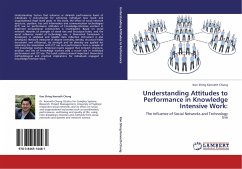Understanding factors that enhance or diminish performance levels of individuals is instrumental for achieving individual (low level) and organisational (high level) goals. In this book, the effect of social network structure, position, ties and information and communication technologies (ICT) use on performance attitudes of knowledge-intensive workers in dispersed occupational communities is investigated. Based on social network theories of strength of weak ties and structural holes, and the social influence model of technology use, a theoretical framework is developed. A validated and reliable data collection instrument is also developed. Network measures of degree centrality, density, structural holes (constraint and efficiency), tie strength and tie diversity are applied for exploring the association with ICT use and performance from a sample of 110 knowledge workers. Empirical results suggest that network structure, position and ties of knowledge workers play a crucial role in individual performance and ICT use. The book outlines several important theoretical, methodological and practical implications for individuals engaged in knowledge-intensive work.
Bitte wählen Sie Ihr Anliegen aus.
Rechnungen
Retourenschein anfordern
Bestellstatus
Storno








